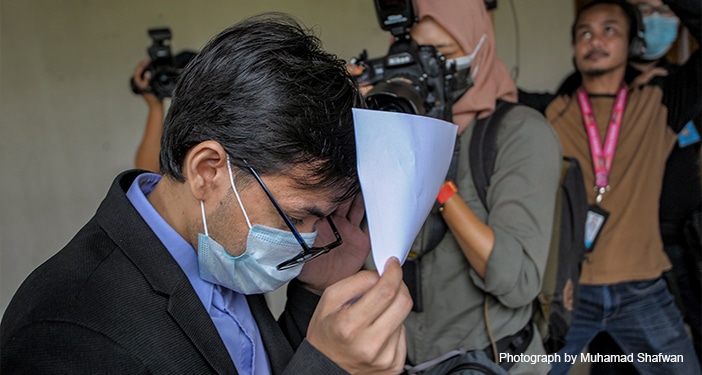In what very well could be the first case of its kind anywhere, a high-ranking company executive in Malaysia has been arrested and criminally charged with whistleblower retaliation.
Wearing a business suit and trying to hide his face behind a piece of paper, Wafiy Abd Aziz was mobbed by reporters during his televised perp-walk at the Kuala Lumpur Sessions Court on September 18. The images could be a sign of things to come, as more countries around the world are passing strong laws that criminalize whistleblower retaliation.
While serving as deputy director of Education Malaysia Global Services, Aziz allegedly encouraged the company’s chairperson to fire an employee who reported misconduct to Malaysia’s Anti-Corruption Commission (MACC), according to local media reports. The company, which promotes educational opportunities in Malaysia for international students, is officially associated with Malaysia’s Ministry of Higher Education.
Aziz was charged under Malaysia’s Whistleblower Protection Act, which makes it a crime to “incite or permit another person” to retaliate or threaten retaliation. The charge, the first filed under Malaysia’s 10-year-old law, is punishable by up to 15 years in prison and a fine of RM100,000 ($24,000), or both. Aziz pleaded not guilty to the charge. A judge ordered him held on bail of RM15,000 ($3,700) and barred him from “bothering any of the prosecution witnesses throughout the trial and until the disposal of the case.”
The details of the whistleblower’s disclosure are not publicly known. However last January, the same month the employee was fired, company Chair Datuk Abdul Rahman Mohamed Shariff was charged with a series of offenses including criminal breach of trust, money laundering, and misappropriating RM178,000 ($44,000) from another organization to fund his own company and buy a stove and cigars, according to local media reports.
MACC did not respond to a request for more information on the case and whether the victimized employee has been reinstated and compensated.
In a statement, MACC said it is “highly concerned about the problems faced by whistleblowers” and that it “will not hesitate to investigate” retaliators. The agency said it hopes the Aziz case will “send a message to the public that they need not fear” reporting misconduct and that the case will “serve as a lesson to those who attempt to take action against whistleblowers.”
Whistleblower protection laws in many countries now include civil and criminal penalties for targeting employees and citizens for retribution. These penalties increasingly are being seen as an effective deterrent against whistleblower retaliation. The European Union Directive on whistleblower protection passed in October 2019 states that criminal, civil or administrative penalties are “necessary” to ensure effective protections, and that these sanctions can “discourage” retaliation.




